- Wednesday, 11 February 2026
Foreign Aid Fails To Fix Inequality
Global inequality has been an interminable characteristic of the global economy with deep-rooted social disparities. Recalling the devastating history of enslavement since the 17th century, for instance, European colonists in America captured and transported African people for inexpensive labour and slaved them. The great empires exploited the land, manufactured and exported merchandise, and obtained abundant wealth by extracting gold, diamonds, metals, oil, rubber, and cotton from various parts of Africa. The enslaved Africans were considered properties, commodities, collateral in business transactions, and loan security. Contemplated as a source of tax revenue; they were value-estimated, traded, and levied with tax. Undeniably, slavery aided to escalate the global economy; the historical prosperity of the Global North ascribes to the Global South.
According to Global Financial Integrity (GFI), a total of US$ two trillion flowed from the global north to the global south by means of assistance, loans, and foreign investments in 2012. Nevertheless, a total of US$ five trillion flowed from the global south to the global north in the form of cheap labour and resources. These exhilarating statistics reveal the net yield of US$ three trillion circulated to the global north from the global south. The massive annual relocation of wealth from low or middle-income nations to rich and powerful regions has consequently led to an enormous income gap.
Vicious cycle of poverty
According to the United Nation Human Rights Commission, the poorest 60 per cent of humanity receives only 12 per cent of the total net wealth, while 10 per cent of the inhabitants of the Organisation of Economic Cooperation and Development (OECD) countries control 52 per cent, condemning the poor to a vicious cycle of poverty. Nevertheless, people from the global south contribute utmost labour and resources to the world economy. Meanwhile, in the colonial period, the global north plundered and looted the global south for their own enrichment ensuing global inequality which has persisted hitherto and even now.
Development Assistance Committee (DAC) members and multilateral institutions are generously providing public aid for economic development and the welfare of developing and least developed countries. According to Official Development Assistance (ODA) Levels in 2021, the United States, Germany, United Kingdom, Japan, and France are the major donor countries which provided 0.33 per cent, 0.68 per cent, 0.50 per cent, 0.31 per cent and 0.53 per cent of their Gross National Income (GNI) respectively; still below the United Nation's target of 0.7 per cent of GNI.
Despite copious foreign assistance, development cooperation and grants; why is the inequality gap amplifying rather than narrowing down? According to the World Bank, Goss Domestic Product (GDP) per capita difference between the global north and south increased by four times in 2017 compared to 1960. According to Fortune, 1 per cent of the elite population possess 38 per cent of global wealth by 2021 and the world´s affluent 27 people hold equivalent wealth as the impoverished 50 per cent of the population.
Besides humanitarian and disaster relief, official aid is immensely criticised for not contributing to economic growth and poverty reduction. A Zambian economist, Dambisa Moyo, in her book "Dead Aid" (2009), has robustly demonstrated how public assistance hasn't worked, caused poor growth, encouraged corruption and conflict, and undermined social capital in Africa. Furthermore, an economist professor at New York University, Willian Easterly, in his book "The White Man´s Burden" (2007) has clinched that Western efforts to assist have been so much ill and so little good.
Broadly, nations support aid for three conceivable reasons; the first is the ethical or moral purpose of compensating the pre-colonial nations for past wrongs. For instance, the United Kingdom gives aid to Nigeria, Somalia, and Afghanistan. Secondly, it is for maximising economic self-interest of market expansion in recipient countries, which is particularly a tied aid. Thirdly, it is for achieving strategic, geo-political and security interests, and buying alliances and shaping ideologies. For example, the United States offered utmost assistance, meanwhile, during the Cold War period to enlarge its influence against the Soviet Union and vice versa.
Donors often seem to overlook international commitments at the expense of their own interests. The Paris Declaration for Aid Effectiveness (2005) outlined substantial principles including ownership of recipients, alignment of donors with local strategies and systems of recipients, and mutual accountability of donors and recipients for development results. Similarly, Accra Agenda for Action (2008) in Ghana endorsed noteworthy values comprising no fragmentation, utilisation of recipients' own fiduciary systems in aid implementation and untying aids. Despite vows of decreased conditionality and mutually decided criterion; unfortunately, aid emanates with strings deliberating donor's national interest and security.
Tied aid resembles fraud and donors' hypocritical of generosity, persuading recipients to devote toward their own commodities and loans and withholding the debt with interest in a much more adroit approach. It leaves the least developed with aid dependency, coercing them to accompany their policy and principles and more decisively promoting their own concealed interest. They offer with one hand, and withdraw substantially more with the bigger hand.
Asymmetrical power
Furthermore, the United States exclusively holds 17.43 per cent of the votes (by 2022) and vetoes majority decisions in the International Monetary Fund (IMF) while in the global south, about 85 per cent of the population holds less than 50 per cent. The power asymmetries in multilateral institutions such as the World Bank, IMF, and World Trade Organisation evoke an influential quote by George Orwell from his book 'Animal Farm', - "All animals are equal, but some animals are more equal than others".
In this contemporary age of globalisation, no country can envisage progress and prosperity in isolation. In fact, development cooperation, mutual exchanges, and international relations can't be circumvented. Foreign assistance is indispensable for technological development and stabilising investment and savings and foreign exchange and balance of payments. Therefore, aid should be acknowledged cautiously considering its geo-political sensitivity and longstanding impact. Least developed countries like Nepal can benefit from assistance only when it is mobilised as per our national interest and priorities, with no strings attached.
(Neupane is a Section Officer at the Ministry of Federal Affairs and General Administration, and Post-Graduate student at Geneva Business School.)







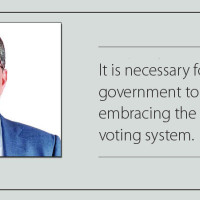


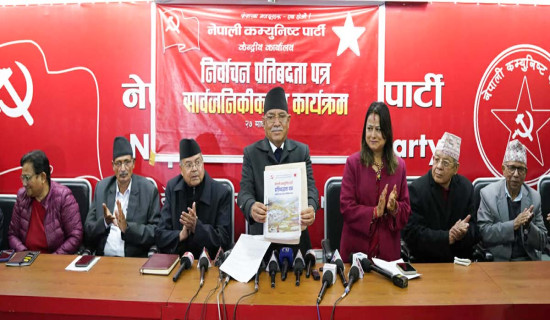
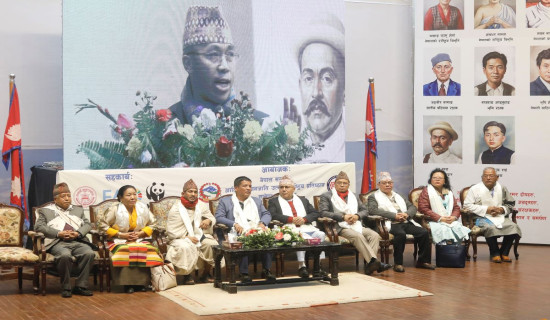
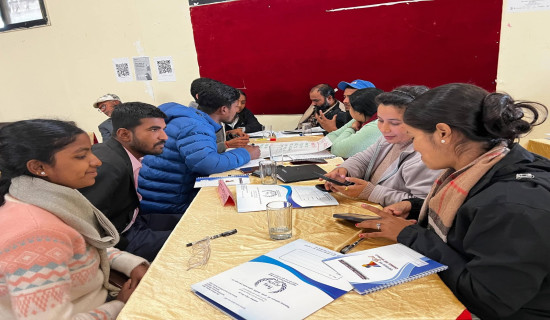

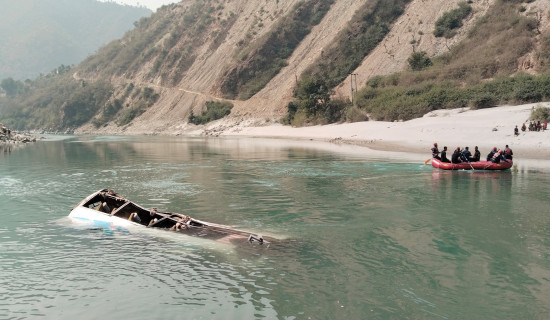

-original-thumb.jpg)